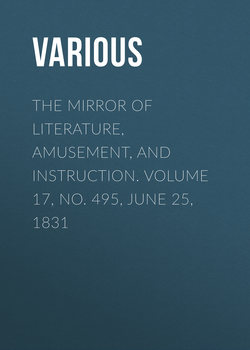Читать книгу The Mirror of Literature, Amusement, and Instruction. Volume 17, No. 495, June 25, 1831 - Various - Страница 2
THE NOVELIST
ОглавлениеOSMYN AND ZAMBRI
A Persian Tale. From the French
(From a Correspondent.)
A worthy old Persian having arrived at the end of an irreproachable life, experienced in his last moments the greatest uneasiness for the fate of his two sons, whom he was about to leave without fortune, without a livelihood, and without a prospect. The elder called Osmyn, was twenty years of age, and the younger, eighteen, bore the name of Zambri.
As the old man drew near his last hour, he thought much less of his own sufferings than of the fate of his children, when his ear was agreeably struck with a soft and melodious voice, which said to him, "Fear nothing, old man, I will watch over your children; die in peace as thou hast lived. I bring a present for each of your sons; let them make good use of it, and one day perhaps they may be re-united, and live in happiness."
At these words a balsamic odour spread itself in the cottage, and a bright light discovered to the view of the astonished Persian, the features of a young man, whose expressive countenance had in it something celestial. It was a beneficent genius, who after having deposited his presents on the bed of the old man, vanished like lightning. The old man called his two sons, they ran eagerly towards him with a light, and approached the bed of their father, who related to them the visit he had been honoured with, and showed them the presents of the genius. On one side was a small box covered with brilliant spangles; on the other a sheet of paper carefully sealed. "Come Osmyn," said the old man, "you are the eldest, it is for you to choose."
Osmyn attracted by the richness of the box, chose it with eagerness, and poor Zambri was obliged to be contented with the humble envelope. The old man embraced them, blessed them, and died as one resigning himself to the arms of hope. After having wept sincerely the death of so good a father, and having rendered the last offices to his remains, the two brothers were anxious to know what aid they should find in the presents of the genius. Osmyn opened his little box and found it filled with pastilles of divers forms and colours. He was almost tempted to laugh at the meanness of such a gift, when he perceived these words written on the lid of the box—"Each time that thou eatest one of these pastilles, thine imagination will bring forth a poem perfect in all its parts, sublime and delicate in its details, such in short as will surpass the ablest works of the best Persian poets."
Osmyn did not want vanity; the possession of so fine a secret failed not to turn his young brain, and a hundred illusions of fortune and glory presented themselves at once to his imagination.
From the value of the present given by the genius to his brother, Zambri doubted not that his paper contained also some marvellous secret. He opened it and read with as much surprise as sorrow—"A new Receipt for preparing Sherbet." Some lines pointed out the method of composing a liquor, of which one drop only being infused in a bowl of Sherbet, would give it a taste and perfume hitherto unknown to the most voluptuous Asiatics.
Osmyn was overjoyed, and Zambri was in despair; Osmyn wished not to quit his brother, but the orders of the genius were imperative. The two brothers embraced each other tenderly, shed tears, and separated. The eldest took the road to Bagdad, where all the learned, and all the poets of Asia were assembled to attend the court of the Caliph. As to poor Zambri, he quitted the cottage of his father, carrying nothing with him but the humble receipt for preparing Sherbet, and leaving to chance the direction of his course.
Before his arrival at Bagdad, Osmyn had already eaten half-a-dozen of the pastilles, and consequently carried with him half-a-dozen poems, beside which were to fade the productions of the greatest Eastern poets. But he soon found that pretenders to talent often succeed better than those who really possess it. He felt the necessity of connecting himself with literary men, and men of the world; but he only found them occupied with their business, their pleasures, or their own pretensions. Under what title could he present himself? Under that of a poet? The court and the city overflowed with them; they had already filled every avenue. To consult his fellows would be to consult his rivals; to ask their praises would be to ask a miser for his treasures. Besides, so many books appeared, that people did not care to read. However, Osmyn's works were published, but they were not even noticed in the multitude of similar productions.
After having vegetated four or five years at Bagdad, without obtaining anything but weak encouragement given by wise men, (who are without influence because they are wise,) poor Osmyn began to lose the brilliant hopes that formerly had dazzled him. However, by dint of eating the pastilles, he at last attracted some notice. If it requires time for genius to emerge from obscurity, no sooner is it known than recompense is made for slow injustice. It is sought after not for itself, but for the sake of vanity. Envy often avails itself of it as a fit instrument subservient to its own purposes. Soon, in fact, the works of Osmyn only were spoken of, and after languishing a long time unnoticed, he saw himself at once raised to the pinnacle, without having passed the steps which lead from misery to fortune, from obscurity to glory.
